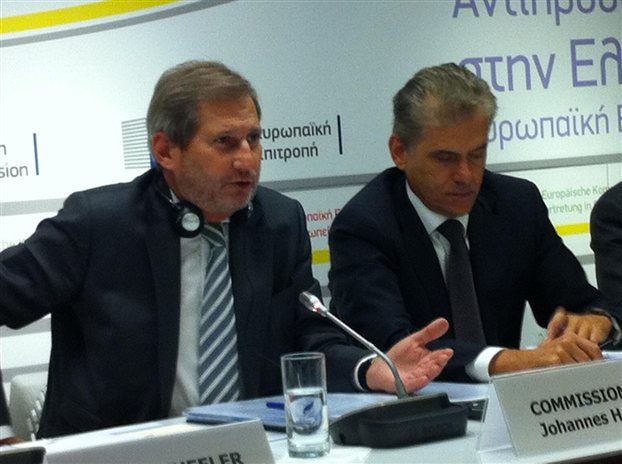Photos: axortagos.gr and To Vima
Victoria Mindova
French president Francois Hollande and Italian Prime Minister Mario Monti have accepted the invitation of the Greek Prime Minister Antonis Samaras to visit Athens soon. The European leaders were at the regular summit in Brussels, which sought a solution to reinforce the Union at a time of deepening crisis. There was progress on the integration of the supervision of banks in the euro area, but the issues related to the debt crisis remained at the periphery of the talks. The Greek Prime Minister described the country's relations with France as excellent and said that Europe in general evaluated the difficulties the Mediterranean country was experiencing along the path of readjustment.
Samaras stressed to his European counterparts that the economy and society in Greece were at the end of their tether. "Liquidity, which is the lifeblood of the economy, is zero, unemployment has reached nightmarish levels and every Greek is going through a personal drama," the Prime Minister said. He stated that the recession fostered extremism, populism and unacceptable political phenomena.
It has become clear after the summit of leaders that the aid tranche of 31.5 billion euro is expected to come along with the report of the supervisory Troika of the International Monetary Fund, the European Central Bank and the European Commission by the middle of November.
 Meanwhile, European Commissioner for Regional Development Johannes Hahn visited Athens and said that Greece could use by the end of the year three billion euro from the subsidies allocated by the Union. In 2012, Greece used 700 million euro, which is above the average rate for Europe, according to the Commissioner. However, the difficult financial situation in the country should be a catalyst of a more active use of EU funds.
Meanwhile, European Commissioner for Regional Development Johannes Hahn visited Athens and said that Greece could use by the end of the year three billion euro from the subsidies allocated by the Union. In 2012, Greece used 700 million euro, which is above the average rate for Europe, according to the Commissioner. However, the difficult financial situation in the country should be a catalyst of a more active use of EU funds.
Johannes Hahn said he was disappointed by the frozen initiative between the Greek government and the European Investment Bank (EIB), which should have provided financing to small and medium-sized enterprises.
In March, both the investment bank and the government signed an agreement for the establishment of a guarantee fund to provide financing to real business. Under the plan, small and medium-sized enterprises in Greece should have had access to 440 million euro in low-interest loans that never came to the country. The Commissioner stressed that despite the delay, the guarantee fund would start operating by the end of the month with a reduced capital of 150 million euro.
Greek economic analysts told GRReporter that it was not uncommon for the European Investment Bank to have hampered the acceptance of Greek government guarantees so as not to damage its excellent credit status.
The Commissioner acknowledged that the Greek government has fulfilled its part of the deal in order to put the additional funding for small and medium-sized enterprises into operation. Hahn made it clear that the European Investment Bank has created the obstacles and he has pledged to exert pressure for putting the fund into action as soon as possible.
The programme for the use of EU funds under the national framework for strategic development (EMPA) includes 180 priority projects worth 11.5 billion euro. Of these, 40 are at risk of losing their funding, which is approximately five billion euro, if no significant progress is demonstrated by 2015. Among them, are four projects for the construction of key highways, which are expected to greatly contribute towards the recovery of the troubled economy.